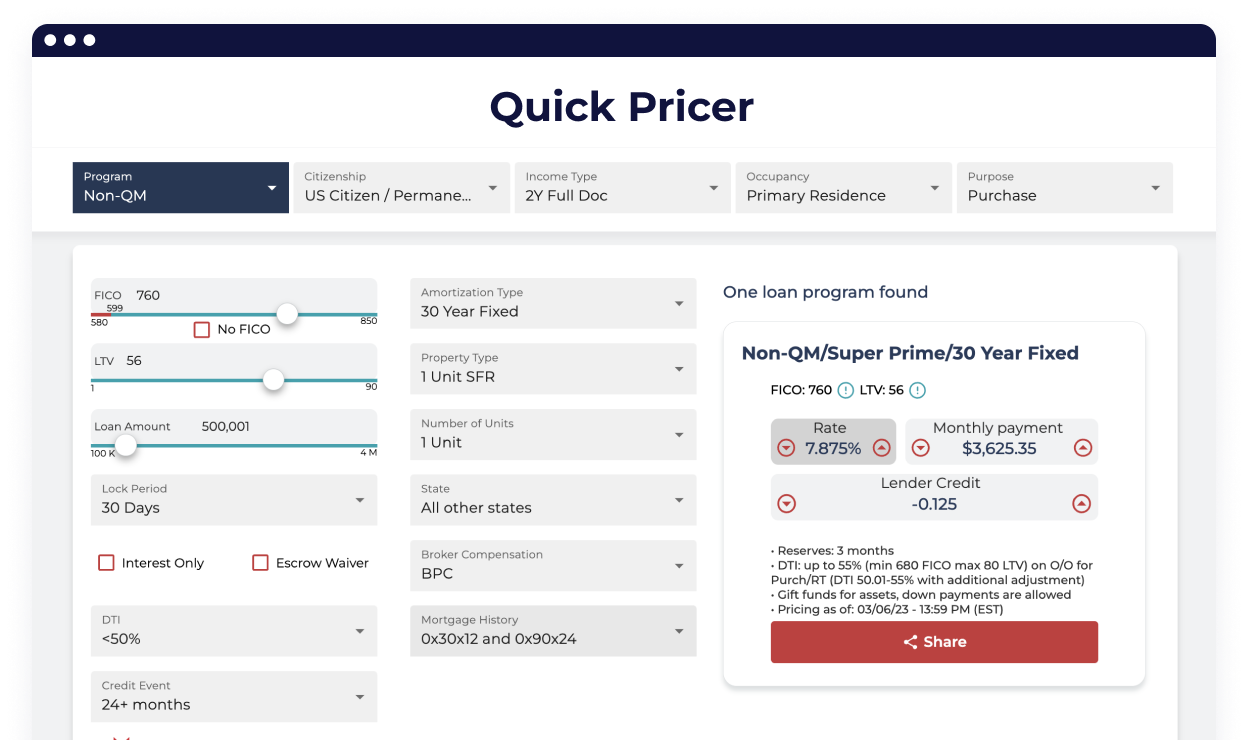Our 12/24 Month Bank Statement loan is a perfect Non-QM loan for the self-employed. Even if complex tax deductions make their tax returns less than straightforward, this program can provide a clearer picture of their current income or revenue to help them qualify.
Program features
Struggling with a loan scenario? Push the button and get a solution in 30 minutes!
Write to us, we will contact you within 30 minutes.

24 hours
24 hours
24 hours
A Bank Statement loan is a home loan program designed for self-employed/ business owners. For qualification purposes, the lender uses the deposits made into the business owner’s account as the source of income for qualification purposes, instead of using the applicant’s tax returns.
Bank Statement loan is not a subprime loan. Instead, it is a secondary market loan program for Non-QM loans that qualifies the applicant’s income; however, it uses alternative ways to qualify the applicant. Many Non-QM programs like Bank Statement Loans, are designed around the lending needs of a certain market segment. Bank Statement Loans are designed for the unique lending needs of Self-employed/ business owners.
The primary difference between a Bank Statement loan and a traditional loan is that the applicant qualifies based on the deposit income in the bank statement, rather than the applicant’s tax returns.
A borrower has to be in business at least for 24 months to qualify for a Bank Statement Loan.
For Bank Statement loans, we normally ask applicants to provide the most recent 24 months of bank statement, but there are times when reviewing only the most recent 12 months is a better approach, especially if their business suffered an unusually down year as many did in 2020. A&D works with your clients to determine which path is the best for them and their situation and goals.
If their ordinary business income is deposited into a personal account, applicants can use personal bank statement. Keep in mind, that this may potentially complicate the approval process if they share this account with another person, such as a spouse who has a job. If they are a 1099 wage-earner and depositing their income into a personal account, we suggest using our 1099 income program.
Yes. If borrowers are qualifying for a bank statement loan, they may be asked to provide a letter from a licensed tax preparer. On a Bank Statement Loan, we are not reviewing tax returns, so we rely on third parties such as a licensed tax professional to verify certain aspects of their business.
Here are some examples of the things commonly requested:
No. For a Bank Statement loan, the letter can come from any licensed tax preparer, accountant, or CPA. The letter must appear on their letterhead, be signed, and be dated. We need to be able to verify the tax professional’s Preparer Tax Identification Number (PTIN) or CPA license number.
YES. The letter being provided relies on third-party information provided by a licensed tax professional and is not expected to directly match the information seen in the tax returns. Unlike a traditional home loan program, on a Bank Statement Home loan program, the lender does NOT pull a tax return transcript of the applicant’s personal or business returns from the IRS.
They can but it would be much easier using our 1099 income program. Bank Statement loans were designed for true business owners. So, an independent contractor earning 1099 wages is technically not self-employed. If the employer pays the applicant in 1099 wages, then the only time the applicant is considered self-employed is by the IRS when they file tax returns, and neither of these two programs uses tax returns. If applicants receive 1099 wages, a 1099 Income Program is designed more for this type of income and may end up giving them more income—and even greater buying power than they would with a Bank Statement Loan. The two programs are remarkably similar, in terms of minimum down payment, minimum credit scores, etc.
Yes, but unless the business partner is also qualifying for the same home loan with you, then it would reduce the amount of income by their percentage, which could in turn significantly reduce the amount of house they can afford. For instance, by owning 50% of the business, then the borrower can only use 50% of the income from the bank statement income analysis.
Yes. We will calculate the business owner’s income using Bank Statement and the spouse’s income will be calculated with their W2s, pay stubs, and an Employment Verification from their employer.
No. IRS Form 4506-C authorizes us to pull a tax return transcript and signing one is not required for a Bank Statement Loan.
No. Co-signers and applicants who are not occupying the new home are not allowed on a Bank Statement Loan Program.
YES, as long as the bankruptcy, foreclosure, or short sale is completed at least 12 month ago or longer. Depending on the length of time after the certificate of title date, it may affect the minimum down payment on a home.
No. Cryptocurrency deposits cannot be used to qualify for a Bank Statement Only US bank accounts can be used in the income calculation.